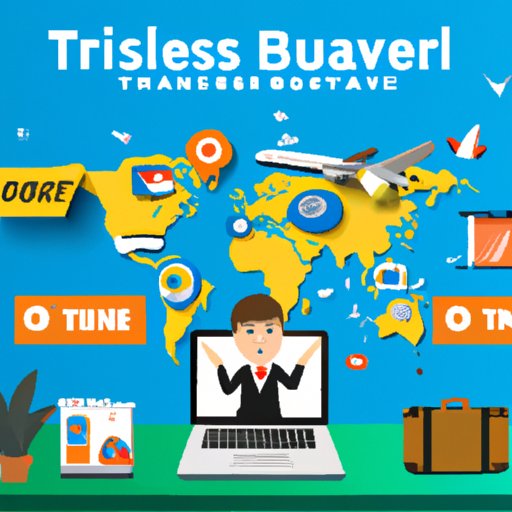Introduction
Dreaming of becoming a successful home-based travel agent? With the right knowledge and planning, it’s possible to create a thriving business from the comfort of your own home. But before diving in, it’s important to understand the requirements for becoming a travel agent and the steps involved in setting up a home-based business.
Research the Requirements for Becoming a Home-Based Travel Agent
The first step in becoming a home-based travel agent is to research the licensing and education requirements in your state or country. Depending on where you live, there may be restrictions on who can work as a travel agent, so it’s important to make sure you’re legally allowed to operate. Additionally, some countries require travel agents to have special certifications or degrees in order to be licensed.
In the United States, the National Association of Career Travel Agents (NACTA) offers a certification program for aspiring home-based travel agents. According to NACTA, “the certification program is designed to provide travel professionals with the tools and resources they need to succeed in the industry. It includes courses on sales, customer service, and product knowledge.”
Aside from licensing and certification requirements, it’s also important to consider other factors when starting a home-based travel agency. You’ll need to invest in the necessary equipment and technology to run your business, including a computer, printer, internet connection, and office supplies. Additionally, you’ll need to have enough space in your home to accommodate clients.
Create a Business Plan for Your Home-Based Travel Agency
Once you’ve researched the requirements for becoming a home-based travel agent, the next step is to create a business plan. This will help you develop a clear vision for your business and ensure that you have all the necessary resources and processes in place to be successful. A business plan should include the following elements:
Define Your Services
When writing your business plan, you’ll need to define the services you plan to offer as a travel agent. Will you specialize in a certain type of travel, such as cruises or adventure trips? Or will you offer a variety of services to meet the needs of different types of travelers? Defining your services will help you target the right customers and develop a unique brand for your business.
Calculate Start-Up Costs
Creating a budget for your business is essential for ensuring its success. You’ll need to calculate the costs of setting up your home office, purchasing equipment, and investing in marketing materials. Additionally, you may need to factor in the cost of any certifications or training programs you’ll need to take.
Estimate Revenue
It’s also important to estimate the potential revenue you can expect to generate with your business. According to the U.S. Bureau of Labor Statistics, the median annual wage for travel agents was $38,700 in 2019. Keep in mind that this figure may vary depending on the services you offer and the number of clients you serve.
Develop an Operational Plan
Your business plan should also include an operational plan that outlines the day-to-day operations of your business. This should include tasks such as responding to customer inquiries, booking reservations, and managing accounts. Having a detailed plan in place will help you stay organized and maximize efficiency.

Establish Professional Relationships with Suppliers and Vendors
As a home-based travel agent, it’s important to establish professional relationships with suppliers and vendors in the travel industry. These relationships will give you access to exclusive deals and discounts that you can pass on to your clients. Additionally, working with reliable suppliers and vendors will ensure that your clients have a positive experience.
Research Potential Partners
Before entering into any agreements, it’s important to do your research and find suppliers and vendors that offer the best deals and services. Make sure to read reviews and speak to other travel agents about their experiences with different companies. Additionally, you should compare prices and look for any hidden fees or restrictions.
Negotiate Contracts
Once you’ve identified potential partners, you can begin the process of negotiating contracts. It’s important to clearly communicate your expectations to suppliers and vendors and negotiate terms that are beneficial to both parties. You should also make sure to get everything in writing to protect yourself and your clients.
Monitor Performance and Quality
Finally, it’s important to monitor the performance and quality of the services provided by your suppliers and vendors. This will ensure that your clients receive the best possible experience and that your business isn’t affected by any unexpected issues. If you encounter any problems, make sure to contact your partners immediately so that they can be addressed.
Market Your Home-Based Travel Agency
Once you’ve established your business and developed relationships with suppliers and vendors, it’s time to start marketing your home-based travel agency. There are a variety of techniques you can use to reach potential customers, both online and offline.
Develop a Brand and Identity
The first step in marketing your business is to create a strong brand and identity. This will help you stand out from the competition and build trust with your customers. Develop a logo, slogan, and website that reflect the values and mission of your business.
Utilize Traditional Advertising Techniques
You should also consider utilizing traditional advertising techniques such as print ads, radio spots, and direct mail. These methods can help you reach a wider audience and drive more traffic to your website. Additionally, you can partner with local businesses to promote your services.
Leverage Online Marketing Strategies
In addition to traditional advertising, it’s also important to leverage online marketing strategies such as search engine optimization (SEO), pay-per-click (PPC) campaigns, and social media advertising. These tactics can help you reach a larger audience and increase your visibility on the web.
Develop an Online Presence Through Social Media
Social media is an invaluable tool for home-based travel agents. Platforms such as Facebook, Twitter, Instagram, and Pinterest can help you connect with potential clients and showcase your services. Here are a few tips for developing an effective online presence:
Create Accounts on Popular Platforms
Before you can start using social media to market your business, you’ll need to create accounts on the most popular platforms. Make sure to choose usernames that are consistent across all platforms so that it’s easy for customers to find you.
Design Engaging Content
Once you’ve created your accounts, you can start designing content that will engage your followers. Post pictures of your travels, share helpful tips and advice, and respond to customer inquiries. Additionally, you can use social media to promote special offers and discounts.
Monitor Feedback and Reviews
Finally, it’s important to monitor feedback and reviews on social media. Respond to any negative comments in a timely manner and address any issues that arise. This will help you build trust with your customers and maintain a positive reputation.
Network with Other Home-Based Travel Agents
Networking with other home-based travel agents is a great way to exchange ideas, learn new strategies, and stay up to date with industry trends. Participating in industry events, joining professional organizations, and exchanging information are all excellent ways to network with other travel agents.
Participate in Industry Events
Industry events such as conferences and trade shows are a great way to meet other travel agents and learn about the latest developments in the industry. Additionally, attending these events can help you build relationships with suppliers and vendors.
Join Professional Organizations
Joining professional organizations such as NACTA can help you stay informed about industry news and gain access to exclusive deals and discounts. Additionally, many organizations offer educational opportunities and resources that can help you improve your skills as a travel agent.
Exchange Information and Resources
Finally, don’t be afraid to reach out to other travel agents and exchange information and resources. Ask questions, share tips, and provide feedback to help each other succeed. Working together can help you grow your business and create meaningful connections within the industry.
Conclusion
Becoming a home-based travel agent is an exciting opportunity that requires careful planning and preparation. You’ll need to research the licensing and education requirements, create a business plan, establish relationships with suppliers and vendors, and market your business. Additionally, you should leverage social media and network with other travel agents to grow your business. By following these steps, you can create a successful home-based travel agency.
(Note: Is this article not meeting your expectations? Do you have knowledge or insights to share? Unlock new opportunities and expand your reach by joining our authors team. Click Registration to join us and share your expertise with our readers.)
